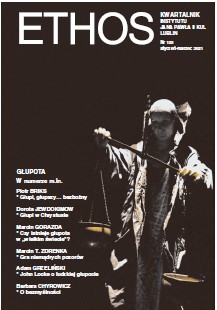OBŁĄKANI, IDIOCI I OGRANICZENIA LUDZKIEGO ROZUMU. JOHN LOCKE O LUDZKIEJ GŁUPOCIE
MADMEN, IDIOTS, AND THE LIMITATIONS OF HUMAN UNDERSTANDING: JOHN LOCKE ON HUMAN FOLLY
Author(s): Adam GrzelińskiSubject(s): Early Modern Philosophy, Philosophy of Mind
Published by: Katolicki Uniwersytet Lubelski Jana Pawła II - Instytut Jana Pawła II, Wydział Filozofii
Keywords: John Locke; understanding; folly; madness; idiocy;
Summary/Abstract: The article discusses the various manifestations of human irrationality analyzed by John Locke in his Essay Concerning Human Understanding. According to Locke, human understanding’s weaknesses have a twofold character: they can be treated as natural imperfections of cognitive faculties and as mental diseases such as madness. Locke’s analyses lead to the conclusion that the notion of human nature has no clearly delineated boundaries. Rationality, an essential quality of a human being, is only a potency that can be realized to a varying degree. Children, idiots, and madmen occupy a specific place: they are human, but their minds function in a limited way. It turns out that folly is permanently inscribed in human nature and can manifest itself as the immaturity or defect of the reason of individual people, but also of human societies. The task of philosophy is not so much to cure the human mind as to prevent its diseases. Seen from this perspective, Locke’s writings on practical issues, whether religious or political, serve this very project: preventing an excessive development of human irrationality.
Journal: Ethos. Kwartalnik Instytutu Jana Pawła II KUL
- Issue Year: 34/2021
- Issue No: 1
- Page Range: 149-167
- Page Count: 19
- Language: Polish
- Content File-PDF

